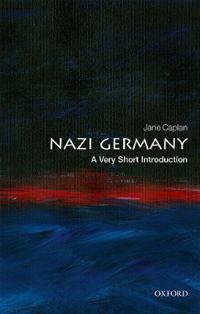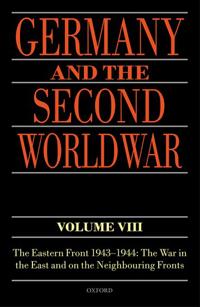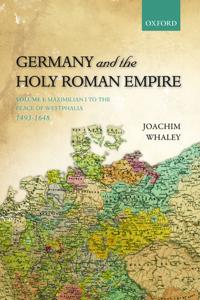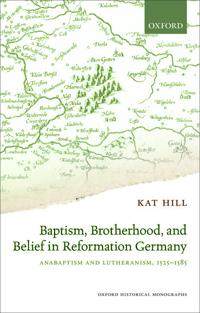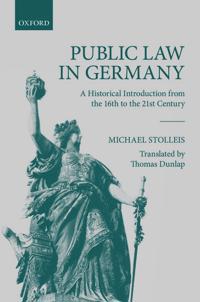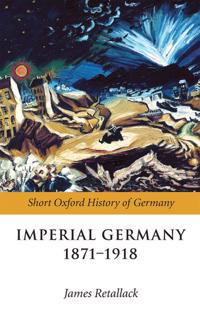Language and German Disunity: A Sociolinguistic History of East and West in Germany, 1945-2000 (Inbunden)
avPatrick Stevenson
ISBN: 9780198299691 - UTGIVEN: 2002-12-12Language and German Disunity: A Sociolinguistic History of East and West in Germany 1945-2000 (Pocket)
avPatrick Stevenson
ISBN: 9780198299707 - UTGIVEN: 2002-12-12Oxford AQA History for GCSE: Germany 1890-1945: Democracy and Dictatorship (häftad)
ISBN: 9780198370109 - UTGIVEN: 2016-03Germany 1890-1945: Democracy and Dictatorship is part of a brand new series written specially to match the new 2016 AQA GCSE History specification, and is developed by an expert team led by an experienced head of history and an author with senior examining experience. This Germany Period Study focus[...]
Postcolonial Germany: Memories of Empire in a Decolonized Nation (Inbunden)
avBritta Schilling
ISBN: 9780198703464 - UTGIVEN: 2014-03-06Germany and the Second World War
ISBN: 9780198723462 - UTGIVEN: 2017-05The latest volume in the magisterial Germany and the Second World War series, volume VIII deals with one of the most eventful phases of the Second World War: the battles on the eastern front in 1943 and 1944. In no other period of the war, apart from its concluding phase in 1945, did the Wehrmacht s[...]
Germany and the Holy Roman Empire (Inbunden)
avJoachim Whaley
ISBN: 9780198731016 - UTGIVEN: 201111Germany and the Holy Roman Empire offers a new interpretation of the development of German-speaking central Europe and the Holy Roman Empire or German Reich, from the great reforms of 1495-1500 to its dissolution in 1806 after the turmoil of the French Revolutionary and Napoleonic Wars. Going agains[...]
Baptism, Brotherhood, and Belief in Reformation Germany
ISBN: 9780198733546 - UTGIVEN: 2015-05When Martin Luther mounted his challenge to the Catholic Church, reform stimulated a range of responses, including radical solutions such as those proposed by theologians of the Anabaptist movement. But how did ordinary Anabaptists, men and women, grapple with the theological and emotional challenge[...]
Germany and the Second World War
ISBN: 9780198738275 - UTGIVEN: 2015-07By the spring of 1943, after the defeat at Stalingrad, the writing was on the wall. But while commanders close to the troops on Germany's various fronts were beginning to read it, those at the top were resolutely looking the other way. This seventh volume in the magisterial 10-volume series from the[...]
Germany and the Second World War
ISBN: 9780198738282 - UTGIVEN: 2015-07Volume V Part II of the comprehensive and authoritative Germany and the Second World War series spans the years 1942 to 1945, and looks in closely researched detail, and against a background of growing military setbacks and disasters leading to final defeat, at the administration and ruthless exploi[...]
Germany and the Second World War
ISBN: 9780198738299 - UTGIVEN: 2015-07This volume is concerned with developments in wartime administration, economy, and manpower resources in Germany and its occupied territories from 1939-1941. It examines the mobilization of material and personnel resources in the German sphere of power for an industrialized conduct of the war. Indis[...]
Germany and the Second World War
ISBN: 9780198738305 - UTGIVEN: 2015-07Volume VI of the 'Germany and the Second World War' series deals with the extension of a European war into a global one in the period from 1941 to 1943. It focuses on the politics, strategy, and operations of the belligerent powers as Germany lost the initiative to the Allies, and it represents, bot[...]
Germany and the Second World War
ISBN: 9780198738312 - UTGIVEN: 2015-07Nine months after the beginning of the Second World War, German dominance over much of Europe seemed assured. Hitler not only stood on the pinnacle of his popularity in Germany but more than ever his ideological fixations and political calculations determined German war policy. This volume, the four[...]
Germany and the Second World War (Pocket)
avGerhard (EDT) Schrieber, Bernd (EDT) Stegemann, Detlef (EDT) Vogel
ISBN: 9780198738329 - UTGIVEN: 2015-07This is the third in the comprehensive ten-volume Germany and the Second World War. The volumes so far published have achieved international acclaim as a major contribution to historical study. Under the auspices of the Militargeschichtliches Forschungsamt (Research Institute for Military History), [...]
Germany and the Second World War
ISBN: 9780198738336 - UTGIVEN: 2015-07This is the first of a comprehensive ten-volume history of the Second World War, written from the German perspective and translated for the first time into English. The volumes so far published have achieved international acclaim as a major contribution to historical study. Under the auspices of the[...]
Germany and the Second World War
ISBN: 9780198738343 - UTGIVEN: 2015-07This is the second in the comprehensive ten-volume Germany and the Second World War. The volumes so far published have achieved international acclaim as a major contribution to historical study. Under the auspices of the Militargeschichtliches Forschungsamt (Research Institute for Military History),[...]
Germany and the Second World War (Pocket)
avRalf Blank, Jorg Echternkamp, Karola Fings
ISBN: 9780198738350 - UTGIVEN: 2015-07The Second World War affected the lives and shaped the experience of millions of individuals in Germany - soldiers at the front, women, children and the elderly sheltering in cellars, slave labourers toiling in factories, and concentration-camp prisoners and POWs clearing rubble in the Reich's devas[...]
Public Law in Germany
ISBN: 9780198798965 - UTGIVEN: 2017-07German public law has been taught in universities since the early 17th century and continues to this day to be a dominant subject in German legal culture, especially in its modern incarnations of constitutional and administrative law, and European and international law. Michael Stolleis's Public Law[...]
Visions of Community in Nazi Germany: Social Engineering and Private Lives (häftad)
ISBN: 9780198824695 - UTGIVEN: 2018-09When the Nazis seized power in Germany in 1933 they promised to create a new, harmonious society under the leadership of the Fuumlhrer, Adolf Hitler. The concept of Volksgemeinschaft--'the people's community'--enshrined the Nazis' vision of society'; a society based on racist, social-Darwinist, anti[...]
Germany 1858-1990: Hope, Terror and Revival (Pocket)
avAlison Kitson
ISBN: 9780199134175 - UTGIVEN: 2001-06-28Imperial Germany 1871-1918
ISBN: 9780199204878 - UTGIVEN: 2008-06The German Empire was founded in January 1871 not only on the basis of Chancellor Otto von Bismarck's 'blood and iron' policy but also with the support of liberal nationalists. Under Bismarck and Kaiser Wilhelm II, Germany became the dynamo of Europe. Its economic and military power were pre-eminent[...]
Foundations of Ostpolitik, The: The Making of the Moscow Treaty Between West Germany and the USSR (Inbunden)
avJulia Von Dannenberg
ISBN: 9780199228195 - UTGIVEN: 2008-01-10Reforming European Welfare States: Germany and the United Kingdom Compared (Pocket)
avJochen Clasen
ISBN: 9780199232017 - UTGIVEN: 2007-09-20Bismarck Myth, The: Weimar Germany and the Legacy of the Iron Chancellor (Pocket)
avRobert Gerwarth
ISBN: 9780199236893 - UTGIVEN: 2007-10-25Raising Churchill's Army: The British Army and the War Against Germany, 1919-1945 (Pocket)
avDavid French
ISBN: 9780199246304 - UTGIVEN: 2001-07-05





